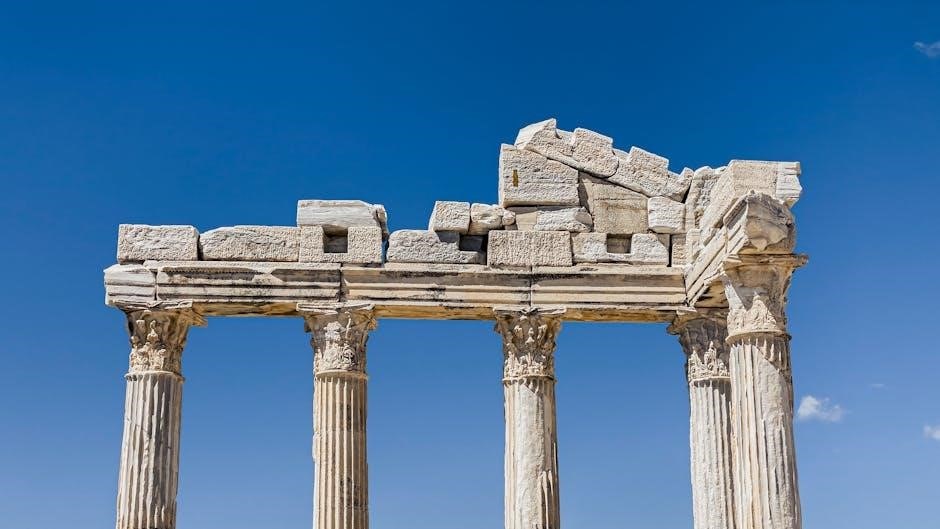Heraclitus’ fragments are essential for understanding his philosophy of flux, opposites, and the Logos. Available in PDF, they offer modern readers accessible insights into his enduring ideas.
1.1 Overview of Heraclitus’ Philosophy
Heraclitus’ philosophy centers on the concept of flux, asserting that change is the fundamental nature of reality. He famously compared life to a river, where everything flows and nothing remains static. Heraclitus also emphasized the unity of opposites, arguing that conflicting forces are interconnected and inseparable. His idea of the Logos suggests a universal principle governing the cosmos, providing order amidst constant change. These concepts, explored in his fragments, offer profound insights into existence, making him a cornerstone of Western philosophical thought.
1.2 The Significance of Fragments in Understanding His Work
The fragments of Heraclitus are the primary source for understanding his philosophy, as his complete works have been lost. These scattered pieces, preserved in quotes and references, provide glimpses into his groundbreaking ideas about flux, opposites, and the Logos. Despite their brevity, the fragments are rich in depth, offering insights into his worldview. Their preservation in various sources underscores the importance of textual reconstruction in grasping his thought. Accessible in modern translations and PDF formats, these fragments remain vital for studying Heraclitus’ enduring philosophical legacy.

Historical Context of Heraclitus’ Fragments
Heraclitus, born in Ephesus, left behind fragments of his philosophy, which were preserved despite the loss of his complete works. These fragments, now widely available in PDF format, provide crucial insights into his ideas about flux, opposites, and the Logos, offering a window into his philosophical contributions and enduring influence.
2.1 Heraclitus’ Life and Background
Heraclitus was born in Ephesus to an aristocratic family, though details of his personal life remain scarce. He declined political roles, preferring solitude and philosophical contemplation. His works, now fragmented, reflect his unique worldview shaped by his environment and era. Despite his reclusive nature, his ideas have endured, influencing Western philosophy profoundly. The mystery surrounding his life adds to the allure of his fragments, which are now widely accessible in PDF collections, offering insights into his transformative thoughts on flux, opposites, and the Logos.
2.2 The Loss and Preservation of His Writings
Most of Heraclitus’ original works have been lost, with only fragments surviving through quotations by later philosophers and writers. These fragments, compiled from various sources, provide glimpses into his philosophy. The Diels-Kranz collection remains a key reference for his surviving texts. Despite the loss of his complete writings, modern editions and translations, including those in PDF format, have made his ideas more accessible. This preservation ensures his philosophical legacy endures, offering insights into his groundbreaking concepts of flux, opposites, and the Logos.
Major Themes in Heraclitus’ Fragments
Flux, the unity of opposites, and the Logos are central themes, offering profound insights into reality and human understanding through his surviving philosophical fragments.
3.1 The Concept of Flux and Change
Heraclitus’ philosophy centers on the idea of flux, emphasizing that change is the fundamental nature of reality. He famously compared life to a river, where the water constantly flows, illustrating that “no man ever steps in the same river twice.” This concept suggests that everything is in perpetual motion and transformation, making stability an illusion. Heraclitus’ fragments, such as Fragment 41, highlight this dynamic view of the universe, where opposites coexist and harmony arises from tension. His ideas on flux have profoundly influenced Western philosophy, offering insights into the transient nature of existence.
3.2 The Unity of Opposites
Heraclitus’ concept of the unity of opposites posits that contradictory forces are inherently interconnected. Fragment 94 highlights this idea, suggesting that all things are one, despite their apparent differences. He illustrates this through natural phenomena, such as the tension in a bow or the harmony of opposing musical notes. This principle underscores the dynamic balance within the universe, where conflict and unity coexist. Heraclitus’ fragments emphasize that opposites are not mutually exclusive but are essential to the structure of reality, reflecting a deeper cosmic harmony.
3.3 The Role of the Logos
Heraclitus’ concept of the Logos represents a universal, eternal principle governing all existence. Fragment 1 emphasizes the Logos as a timeless truth, yet often misunderstood by humanity. It signifies the underlying rational structure of the cosmos, unifying all phenomena. The Logos is both the source of wisdom and the essence of reality, highlighting the interconnectedness of all things. Heraclitus urges individuals to align with the Logos, rather than cling to subjective opinions, to achieve true understanding and harmony with the world.

Availability of Heraclitus’ Fragments in PDF Format
Heraclitus’ fragments are widely available in PDF format through various online platforms and scholarly resources, offering accessible and comprehensive editions for philosophical study and exploration.
4.1 Online Collections and Resources
Several reputable websites offer Heraclitus’ fragments in PDF format, including philaletheians.co.uk, which provides a comprehensive collection with translations and commentary. Google Books and archive.org also host various editions, such as Heraclitus: The Complete Fragments by William Harris. These resources cater to both scholars and general readers, ensuring accessibility to Heraclitus’ timeless philosophical insights. Additionally, academic platforms and libraries often feature downloadable PDFs of his works, making his fragments widely available for study and reflection.
4.2 Notable Editions and Translations
Notable editions of Heraclitus’ fragments include The Art and Thought of Heraclitus by Charles Kahn, offering a literary and philosophical commentary. Fragments: The Collected Wisdom of Heraclitus, translated by Brooks Haxton, presents a poetic rendition. William Harris’ The Complete Philosophical Fragments provides a scholarly Greek text with commentary. These editions, available in PDF, ensure diverse interpretations and accessibility, enriching the study of Heraclitus’ philosophy for both academics and enthusiasts.
Translation and Interpretation of the Fragments

Translating Heraclitus’ fragments poses challenges due to their poetic and enigmatic nature. Scholars like John Burnet and Brooks Haxton offer interpretations that preserve his philosophical depth and original intent.
5.1 Challenges in Translating Ancient Greek Texts
Translating Heraclitus’ fragments is challenging due to their cryptic style and historical context. The lack of complete texts forces translators to rely on fragmented sources, making interpretation subjective. Additionally, the nuances of ancient Greek grammar and vocabulary often complicate conveying his intended meaning. Scholars must balance fidelity to the original language with readability, ensuring Heraclitus’ philosophical depth is preserved while making his ideas accessible to modern readers. This delicate process requires meticulous linguistic and philosophical expertise to honor the fragments’ original intent.
5.2 Comparative Analysis of Different Translations
Different translations of Heraclitus’ fragments reveal varying interpretations of his philosophy. Scholars like John Burnet and Brooks Haxton offer distinct renderings, reflecting their individual perspectives. Comparing these translations highlights the subjective nature of interpreting ancient texts. While some prioritize literal accuracy, others aim for poetic resonance. This diversity enriches understanding, showcasing the fragments’ versatility and depth. Such analyses underscore the importance of consulting multiple translations to grasp the full complexity of Heraclitus’ ideas and their enduring relevance in modern thought.

Key Fragments and Their Philosophical Significance
Heraclitus’ key fragments, such as Fragment 1 and Fragment 94, explore the Logos and the unity of opposites, central to his philosophy of flux and cosmic harmony.

6.1 Fragment 1: The Everlasting Truth of the Logos
Fragment 1, preserved by Sextus Empiricus, introduces the concept of the Logos as an eternal, universal truth. Heraclitus asserts that though the Logos is ever-present, humanity struggles to comprehend it, whether heard for the first time or repeatedly. This underscores the inherent difficulty in grasping fundamental truths. The fragment emphasizes the Logos as a unifying, harmonious principle governing the cosmos, central to Heraclitus’ philosophy of flux and the interconnectedness of all things.
6.2 Fragment 94: The Unity of All Things
Fragment 94 highlights Heraclitus’ belief in the unity of all existence, emphasizing that everything is interconnected. He argues that opposites are necessary for harmony, and their interplay sustains the cosmos. This fragment underscores his metaphysical view that diversity and conflict are essential to the balance of the universe, reinforcing the idea that all things are part of a single, undivided whole. It exemplifies his philosophy of flux and the interconnectedness of reality.

Heraclitus’ Influence on Western Philosophy
Heraclitus’ ideas on flux and the unity of opposites deeply influenced Western philosophy, shaping metaphysical thought and inspiring later philosophers to explore change and harmony in nature.
7.1 His Impact on Ancient Greek Philosophy
Heraclitus’ philosophy profoundly influenced ancient Greek thought, shaping metaphysical debates and inspiring philosophers like Plato and Aristotle. His concepts of flux and the Logos became foundational, offering a unique perspective on reality. The fragments, now widely available in PDF formats, reveal his emphasis on change and unity, which challenged static views of the universe. His ideas also spurred dialectical traditions, as later thinkers engaged with his enigmatic style and profound insights. Heraclitus’ legacy lies in his ability to provoke deeper inquiry into the nature of existence.
7.2 His Legacy in Modern Thought
Heraclitus’ ideas continue to resonate in modern philosophy, inspiring thinkers across various disciplines. His concept of flux aligns with contemporary views on change and impermanence, while his notion of the Logos has influenced theories of language and reality. The availability of his fragments in PDF formats has made his work accessible to a broader audience, sparking new interpretations in fields like existentialism and postmodernism. Heraclitus’ emphasis on paradox and unity remains a cornerstone of philosophical inquiry, encouraging modern scholars to explore the depths of his timeless wisdom.
The Modern Reception of Heraclitus’ Fragments
Heraclitus’ fragments in PDF formats have sparked renewed interest among scholars and students, offering accessible insights into his timeless philosophical ideas and their relevance today.
8;1 Scholarly Debates and Interpretations
Scholars continue to debate Heraclitus’ fragments, exploring their nuanced meanings and philosophical depth. Interpretations often focus on his concepts of flux, the unity of opposites, and the Logos. The river fragment, where he states “no man ever steps in the same river twice,” remains a central topic of discussion. Modern translations and commentaries, such as those by John Burnet and Kathleen Freeman, offer diverse perspectives. PDF editions of his fragments have made these debates more accessible, fostering a deeper understanding of his enduring influence on Western philosophy and contemporary thought.
8.2 Popular Interest and Cultural References
Heraclitus’ fragments have sparked widespread interest beyond academia, inspiring literary works, music, and philosophical discussions. His metaphors, like the river of change, resonate deeply in popular culture. Translations by poets such as Brooks Haxton have made his ideas more accessible, blending philosophy with art. PDF editions of his fragments have further fueled their popularity, allowing modern audiences to engage with his timeless concepts. This cultural resonance highlights the enduring appeal of Heraclitus’ philosophy in contemporary thought and creative expression.
Heraclitus’ fragments, now widely available in PDF, offer timeless wisdom on flux and unity, ensuring his philosophy remains accessible and relevant for modern scholars and enthusiasts alike.
9.1 Summary of Heraclitus’ Enduring Relevance
Heraclitus’ fragments remain profoundly relevant, offering insights into the nature of change, unity, and the human condition. His concepts of flux and the Logos continue to inspire philosophical and cultural discourse. The availability of his fragments in PDF format has made his teachings more accessible, ensuring their influence persists in modern thought and scholarship. Heraclitus’ unique perspective on the interconnectedness of all things resonates across centuries, solidifying his place as a cornerstone of Western philosophy.
9.2 Final Thoughts on the Value of His Fragments
Heraclitus’ fragments are invaluable for their timeless wisdom and profound insights into the nature of reality. Their availability in PDF format ensures accessibility for scholar and enthusiast alike, preserving their relevance. These texts inspire reflection on change, harmony, and the human experience, offering a bridge between ancient and modern thought. Heraclitus’ fragments remain a cornerstone of philosophical inquiry, continuing to spark dialogue and deepen understanding of the world’s complexities.
